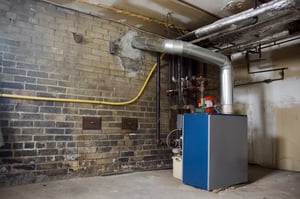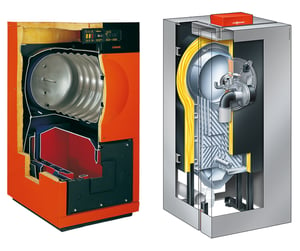Your home’s boiler system has failed - what a bummer! But should you pay for the repair or look into replacing your system with a new one? If this is the first time you’ve had an issue, a repair makes sense.

With proper maintenance, a boiler should last between 15 and 20 years. If your boiler is reaching old age, necessary repairs may become increasingly frequent, and potentially expensive. For older boilers, availability of replacement parts may become a challenge. If repairs are still affordable, it may be a more cost-effective way to get the heat back on in your home, but keep in mind that repair costs will continue to increase as time goes on. Consumer Reports recommends replacing a product once repair bills start to exceed 50% of the cost of a new unit; when your contractor sends over a quote on the repairs, get a quote on a new system and compare.
Could you benefit from advancements in technology?

Think about your first cell phone: it was AWESOME being able to make calls from anywhere, play a round of Snake, or, if you were really fancy, send a text message or two to your friends and family. Phones now can still handle those tasks, but with the added benefits of advancements in technology you can now experiment with AI, video chat with colleagues across the world, and play a movie from anywhere. In a similar scope, a boiler from 20 years ago will still heat up your home, but is there something a bit more… advanced?
Modern boilers are much more efficient than those of the past. While a modern gas condensing boiler is likely above 90% efficient (when properly sized and installed), the boilers of yesteryear may be vastly oversized (which was common in the mid 1900s) and out of date, contributing to reduced efficiency. The good news is that if you replace an older model with a brand new, highly efficient model, you will most likely SAVE money in the long run! In addition to the money-saving side, a modern boiler will also have the ability to more quickly heat up your home and maintain that heat over the long, cold winter.
Are you trying to reduce your carbon footprint? More than 50% of your home’s total energy usage comes from climate control, according to the US Energy Information Administration1. Newer boiler models, especially those that qualify for the ENERGY STAR seal, meet or exceed federal guidelines for energy efficiency and can heat your home with much less fuel than older models.
 How comfortable is your home?
How comfortable is your home?
Are you constantly jumping off the couch to adjust the thermostat, grab a blanket, or to swap the fleece for a pair of shorts on those lazy days at home? Your boiler may be incorrectly sized, inefficient, or in need of some help from a heating expert. All in all, there are no hard and fast rules to tell you when your boilers should be repaired or replaced, but keep in mind the options available and your priorities for repair costs vs. long-term reliability. Check out the available product options, talk to a trusted contractor, and consider your own personal pro and cons list. To see what new boilers may be a good fit for your home, try our interactive Product Selector, or contact a trusted contractor.
1. Use of Energy in Homes; US Energy Information Administration. Sourced December 26, 2019; https://www.eia.gov/energyexplained/ use-of-energy/homes.php
